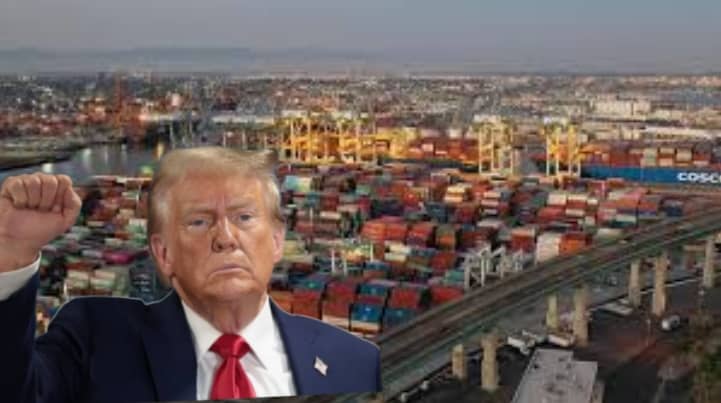Headlines
Trump Vows to Impose Day-One Tariffs on Mexico, Canada, and China

Former President Donald Trump promises to implement tariffs on Mexico, Canada, and China from his first day in office if re-elected, signaling a tough stance on trade relations.
Donald Trump announced plans to impose new tariffs on China, Mexico, and Canada from the first day of his presidency. This move aims to pressure these countries into taking stronger action against illegal immigration and drug smuggling into the United States.
The president-elect announced that he will sign an executive order to impose a 25% tariff on all goods imported from Mexico and Canada right after his inauguration on January 20th.
He also announced that an extra 10% tariff will be imposed on China until its government takes action to prevent the smuggling of the synthetic opioid fentanyl from the country.
If Trump follows through on the threats, it will significantly escalate tensions with America’s three largest trading partners.
The measures could disrupt the global supply chain significantly and would heavily impact the three countries targeted by the tariffs.
According to a post by Trump on his Truth Social platform, tariffs on Mexico and Canada will persist until these countries curtail drug activities, especially fentanyl trafficking, as well as address the issue of migrants crossing the border illegally.
He stated that both Mexico and Canada have the absolute authority and capability to easily resolve this long-standing issue.
“They must now face significant consequences!”
In a different post, Trump criticized Beijing for not fulfilling the promises he claimed Chinese officials made regarding implementing the death penalty for individuals caught dealing fentanyl.
A representative from the Chinese embassy in Washington informed the BBC that “the notion of China deliberately permitting fentanyl precursors to enter the United States is entirely contrary to facts and reality.”
He added that China views economic and trade cooperation with the US as mutually beneficial, emphasizing that no one benefits from a trade or tariff war.
The Biden administration has urged Beijing to intensify efforts to halt the production of ingredients used in fentanyl, which Washington estimates was responsible for nearly 75,000 American deaths last year.
During his election campaign, Trump warned that he might impose tariffs of up to 100% on Mexico and China if he considered it necessary. These potential tariffs were significantly higher than those implemented during his first term in office.
Trump has also stated that he intends to revoke China’s most-favored-nation trading status with the US, which provides the best terms Washington offers concerning tariffs and other trade restrictions.
READ ALSO: Trump Jr;Military-Industrial Complex’ Pushing for World War 3
In the previous year, over 80% of Mexico’s exports were directed to the United States, whereas approximately 75% of Canada’s exports went to its larger neighbor.
Despite years of a bitter trade dispute between the world’s two largest economies, approximately 15% of China’s exports still go to the US.
Tariffs play a crucial role in Trump’s economic strategy, as he views them as a means to bolster the US economy, safeguard jobs, and increase tax revenue.
He previously stated that these taxes would “not be a cost to you, but rather a burden on another country.”
Economists almost universally consider this to be misleading.
Stephen Roach, a Senior Fellow at the Paul Tsai China Center at Yale Law School, told the BBC’s Business Today programme that this aligns perfectly with his campaign promise to use tariffs as a tool for achieving various policy goals.
Scott Bessent, selected by Trump as the Treasury Secretary, has previously indicated that the president-elect’s threats to significantly increase tariffs were a component of his negotiation strategy.
In an interview with the Financial Times conducted before Trump’s nomination, Bessent expressed his belief that ultimately, Trump is a free trader.
“It’s about escalating in order to de-escalate.”
This situation arises at a time when the Chinese economy is considerably more fragile than it was during Trump’s earlier presidency.
The country has been grappling with several significant challenges, such as a persistent property market crisis, sluggish domestic demand, and increasing local government debt.
The new tariffs seem to violate the terms outlined in the US-Mexico-Canada Agreement (USMCA) on trade.
The agreement, enacted by Trump, came into effect in 2020 and maintained a largely duty-free trading relationship among the three neighboring countries.
Following Trump’s tariff threat, he reportedly discussed trade and border security with Canadian Prime Minister Justin Trudeau, as reported by the Reuters news agency.
According to Mexico’s finance ministry, “Mexico stands as the United States’ leading trade partner, with the USMCA offering a framework of certainty for both national and international investors.”
